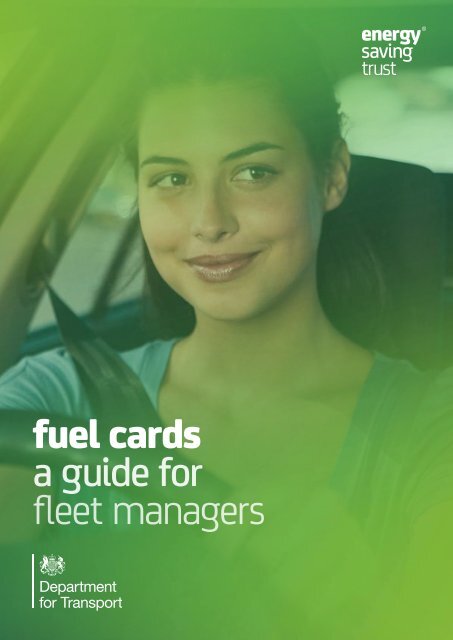You also want an ePaper? Increase the reach of your titles
YUMPU automatically turns print PDFs into web optimized ePapers that Google loves.
fuel <strong>card</strong>sa <strong>guide</strong> forfleet managers
<strong>Fuel</strong> <strong>card</strong>s – a <strong>guide</strong>for fleet managersIntroductionIt is crucial for fleets to monitor fuel purchases inorder to manage and control fuel consumption.<strong>Fuel</strong> <strong>card</strong>s can provide good quality data on fuelpurchases, helping you to monitor individual vehicleand driver fuel economy, and implement effectivestrategies to improve performance.<strong>Fuel</strong> accounting can be facilitated by methods such as credit <strong>card</strong> or petty cash. However,they can be time consuming and not provide the requisite level of control. <strong>Fuel</strong> <strong>card</strong>s offerpotential benefits for fleets in five areas:1. Reduce costs of fuel purchases.2. Allow you to accurately separate thecosts of business and private mileage.3. Provide information which allows youto reduce fuel consumption.4. Reduce security risk.5. Minimise administration and ensurefuel accountability.This <strong>guide</strong>, published by the Energy Saving Trust, will explain these benefits andhelp you to make an informed decision about fuel <strong>card</strong>s for your organisation.2
<strong>Fuel</strong> <strong>card</strong>s – a <strong>guide</strong>for fleet managersWhat is a fuel <strong>card</strong>and how does it work?A fuel <strong>card</strong> looks like a credit <strong>card</strong>, and works in a similar way.It allows drivers to charge the cost of fuel to an account whichis settled, usually monthly in arrears, by their employer.Unlike a credit <strong>card</strong>, interest is notapplied to purchases. However, most fuel<strong>card</strong> suppliers charge an annual fee.<strong>Fuel</strong> <strong>card</strong>s are increasingly chip and PINprotected and can be embossed tospecific company requirements.At the point of purchase, the transaction iscarried out in the same way as with any<strong>card</strong>. The vehicle registration number andmileage are recorded.The consolidated fuel <strong>card</strong> invoice whichorganisations receive shows informationincluding the date, time and place ofpurchase, the fuel type and transactionvalue. The fuel <strong>card</strong> report significantlyreduces administration costs compared toother methods of tracking fuel purchasesand eliminates the need for receipts. Inaddition to the detailed invoice most fuel<strong>card</strong> suppliers will be able to provide furthermanagement reporting.3
<strong>Fuel</strong> <strong>card</strong>s – a <strong>guide</strong>for fleet managersHow can fuel <strong>card</strong>sbenefit your organisation?A fuel <strong>card</strong> can provide a simple, convenientand secure way of taking control of your fuelexpenditure and improving efficiency.There are five general areas where fuel <strong>card</strong>s can help.1. Reduce costs of fuelpurchases• <strong>Fuel</strong> <strong>card</strong> reporting allows the tracking of fuelspend, the type of fuel purchased and thepurchase location. This can help to encouragethe use of lower cost sites and the purchase ofstandard rather than premium fuels.• <strong>Fuel</strong> <strong>card</strong>s give you the opportunity to bettermanage the cash flow for fuel since you pay forthe fuel purchases on a regular basis every month.• You can set limits for fuel <strong>card</strong> usage, forexample to mandate drivers to purchase fuelat supermarkets rather than motorwayservice stations.• Some fuel <strong>card</strong> providers offer fixed prices whileothers offer pump price charges. In the lattercase, if they cover a wide network of fillingstations this gives you and your drivers theflexibility to select those with the cheapestpump prices.2. Allow you to accuratelyseparate the costs ofbusiness and private mileageUsing a ‘fuel at cost’ approach in conjunction withfuel <strong>card</strong>s will enable actual private mileage fuelcosts to be recovered from drivers. This is a bettersolution than using a fixed rate per mile as itencourages efficient driving during both business andprivate use of the vehicle and is the fairest way ofdetermining the cost of private mileage. The simpleexample below shows how this can be calculated:Value of fuel purchased in one month £240Total monthly mileage (business & private) 2,000Monthly private mileage 500Pence per mile (£240/2,000 miles) £0.12Private mileage deduction(500 miles x £0.12)£604
<strong>Fuel</strong> <strong>card</strong>s – a <strong>guide</strong>for fleet managersConsiderations whenchoosing a fuel <strong>card</strong><strong>Fuel</strong> <strong>card</strong>s record excellent data, reduce risk and savemanagement and administrative time.Like other payment <strong>card</strong>s, the choice is broad.Most of them offer more or less similar benefitsbut some present slightly different features thatcould possibly better meet your needs. Whenchoosing a fuel <strong>card</strong>, ensure you understandyour organisation’s needs as this will help youselect the appropriate provider. Factors toconsider include:• The areas in which your drivers usually travel.• Where you are based.• How many vehicles you operate and whattype of fuel they require.• Your current average monthly fuel cost.Based on this information, you can then selectthe features that you require. The key areas toconsider include:• Price of fuel: some providers offer discountedfuel prices, but usually only to large fleets. Itis more common for the forecourt pumpprice to be charged.• Network coverage: some <strong>card</strong>s are restrictedto only one brand of service station; otherscan be used at a range of different locationsincluding supermarkets.• Management reporting: the level of reportingyou receive will vary between fuel <strong>card</strong>suppliers. Consider the requirements forreporting within your organisation and thedetail required.• Restricting purchases: it is possible torestrict what is purchased on the <strong>card</strong>, butthis may vary between providers.7
<strong>Fuel</strong> <strong>card</strong>s – a <strong>guide</strong>for fleet managersNext stepsEnergy Saving Trust canprovide free advice andinformation on allaspects of sustainablefleet management.Our services include:Fleet Health CheckA free online tool to calculate your fleet carbon footprintand provide simple recommendations about where andhow you could cut costs and emissions..Green Fleet ConsultancyOur Green Fleet Consultancy Service can help you cut fleetcosts and carbon emissions whilst enhancing your corporatesocial responsibility. Whether you need a detailed Green FleetReview to identify the cost and carbon saving opportunitiesacross your fleet or you have a specific challenge to overcomein one area, we can help.As well as calculating a fleet carbon footprint, our FleetConsultants can analyse and advise you in the following areas:• company car policy• fuel management systems and processes• grey fleet management• data management• mileage reduction strategies.Ecodriving TrainingSubsidised ecodriving training delivering fuel savingsand safety benefits is available directly from the trainingcompanies listed on our website.Webinars and Fleet BriefingRegular webinars and a monthly newsletter which covera range of topics to help you reduce emissions and cutfleet costs.8
Energy Saving Trust21 Dartmouth StreetLondon, SW1H 9BPenergysavingtrust.org.ukTE828 © Energy Saving Trust,December 2014


